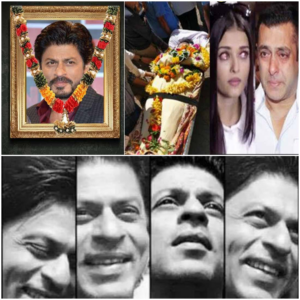Salman Khan sacrificed for his elder sister Alvira, Arpita Khan got a big shock!
.
.
.
In a recent event that has sparked both interest and debate, Bollywood superstar Salman Khan openly addressed the topic of nepotism during the launch of his nephew Ayaan Agnihotri’s new song, “Universal Laws,” in Dubai. The event, held on February 20, 2025, was a star-studded affair, with the Khan family and several Bollywood celebrities in attendance.
The Event: A Family Affair
The launch of “Universal Laws” was not just a professional milestone for Ayaan Agnihotri but also a testament to the close-knit nature of the Khan family. Salman Khan, known for his influential presence in the Indian film industry, took center stage to support his nephew’s musical debut. The event saw the presence of Salman’s brothers, Arbaaz and Sohail Khan, his sisters Alvira Agnihotri and Arpita Khan Sharma, and other family members, highlighting the family’s tradition of supporting each other’s endeavors.
Salman Khan’s Candid Remarks on Nepotism
During the event, host Kris Fade commended Salman Khan and his family for their unwavering support toward Ayaan’s budding career. In response, Salman quipped, “That’s what nepotism is!”
This lighthearted acknowledgment elicited laughter from the audience and has since become a focal point of discussions in the media.
Salman further added, “His parents, good producers. Both the kids, Alizeh and Ayaan.”
This statement underscores the family’s involvement in nurturing the next generation’s talents.
Ayaan Agnihotri: The Emerging Talent
Ayaan Agnihotri, performing under the stage name Agni, is the son of Atul and Alvira Agnihotri. His debut track, “Universal Laws,” marks his official entry into the music industry. Prior to this, Ayaan collaborated with his uncle Salman on the song “You Are Mine,” composed by Vishal Mishra, where he contributed rap segments.
In an interview, Ayaan shared insights into his relationship with his “mamu” (uncle) Salman Khan, stating, “He’s been a great mentor and role model. He cares deeply about people, but he shows his affection in different ways.”
This mentorship reflects the family’s commitment to fostering talent from within.
The Nepotism Debate in Bollywood
Nepotism, defined as the practice of favoring relatives or friends, especially by giving them jobs, has been a contentious topic in Bollywood for years. Critics argue that it creates an uneven playing field, making it challenging for outsiders to break into the industry. Supporters, however, contend that the film industry, like any other, often sees family members following in each other’s footsteps, and having a film background doesn’t guarantee success.
Salman Khan’s jesting acknowledgment of nepotism brings a nuanced perspective to the debate. By openly addressing it, he highlights the familial bonds that influence career trajectories in Bollywood. His comment, “That’s what nepotism is,” suggests a recognition of the advantages his family members may have, while also emphasizing the support system that propels them forward.
Industry Reactions and Public Discourse
The event and Salman’s remarks have ignited discussions across social media platforms and news outlets. Some view his candidness as a refreshing acknowledgment of an existing practice, while others see it as a reinforcement of systemic biases within the industry.
Film critic Anupama Chopra noted, “Salman Khan’s openness about nepotism is a double-edged sword. While it’s commendable that he doesn’t shy away from the truth, it also brings to light the challenges faced by outsiders.”
On the other hand, fans of the Khan family argue that talent and hard work are essential to sustain success, regardless of one’s background. A social media user commented, “Being a Khan might open doors, but it’s their dedication that keeps them in the limelight.”
The Broader Implications
Salman Khan’s remarks come at a time when the entertainment industry is increasingly introspective about its practices. The nepotism debate has led to calls for more inclusive opportunities and merit-based advancements. While family connections can provide initial platforms, the industry’s sustainability relies on genuine talent and audience acceptance.
Moreover, the global reach of Bollywood means that its internal practices are subject to international scrutiny. As the industry evolves, there is a growing emphasis on recognizing and nurturing diverse talents, ensuring that Bollywood remains dynamic and representative of a broader spectrum of stories and voices.
Conclusion
The launch of Ayaan Agnihotri’s “Universal Laws” and Salman Khan’s subsequent remarks have once again brought the nepotism conversation to the forefront. While family support plays a significant role in the careers of many Bollywood stars, the industry’s future hinges on balancing these traditions with a commitment to meritocracy. As audiences become more discerning, the demand for authentic talent and diverse narratives will shape the next chapter of Indian cinema.
In the end, while surnames might open doors, it’s the individual’s talent, perseverance, and connection with the audience that determine longevity in the spotlight. Salman Khan’s acknowledgment serves as a reminder of the existing dynamics, prompting both industry insiders and fans to reflect on the path forward for a more equitable Bollywood.
News
Saif Ali Khan Amrita Singh Ibrahim meeting enjoying Together| Kareena Kapoor Amrita Singh together
Saif Ali Khan Amrita Singh Ibrahim meeting enjoying Together| Kareena Kapoor Amrita Singh together . . . . Saif Ali Khan and Amrita Singh’s Emotional Reunion: Fans Gush Over Their Beautiful Bond In a world where Bollywood relationships often capture…
Sad news for Shah Rukh Khan fans! Say goodbye to Bollywood industry as his health takes a serious turn for the worse!
Sad news for Shah Rukh Khan fans! Say goodbye to Bollywood industry as his health takes a serious turn for the worse! . . . Shah Rukh Khan: A Heartfelt Goodbye to Bollywood? Fans Shocked by False Reports of His…
Nimrat Kaur reached Prayagraj, Abhishek Bacchan got a shock, relationship with Aishwarya Rai broke!
Nimrat Kaur reached Prayagraj, Abhishek Bacchan got a shock, relationship with Aishwarya Rai broke! . . . Nimrat Kaur Visits Prayagraj, Sparks Rumors About Her Relationship with Abhishek Bachchan Nimrat Kaur, known for her stellar performances in films such as…
Salman Khan Finally Marries Tamannaah Bhatia! Aishwarya Rai’s Attitude When Her Ex Gets Married?
Salman Khan Finally Marries Tamannaah Bhatia! Aishwarya Rai’s Attitude When Her Ex Gets Married? . . . Salman Khan Finally Marries Tamannaah Bhatia! Aishwarya Rai’s Attitude When Her Ex Gets Married? The Bollywood industry has been buzzing with excitement after…
Amitabh Bacchan is upset with this act of his daughter Shweta, he himself made a shocking revelation!
Amitabh Bacchan is upset with this act of his daughter Shweta, he himself made a shocking revelation! . . . Amitabh Bachchan’s Shocking Revelation About His Daughter Shweta: A Heartfelt Confession on KBC 16 In a recent episode of Kaun…
Latest news about Aaradhya Rai and Aryan Khan’s wedding at Mumbai’s biggest hotel!
Latest news about Aaradhya Rai and Aryan Khan’s wedding at Mumbai’s biggest hotel! . . . Aaradhya Rai and Aryan Khan’s Wedding at Mumbai’s Premier Hotel: A Grand Affair In a dazzling display of opulence and tradition, the much-anticipated wedding…
End of content
No more pages to load











